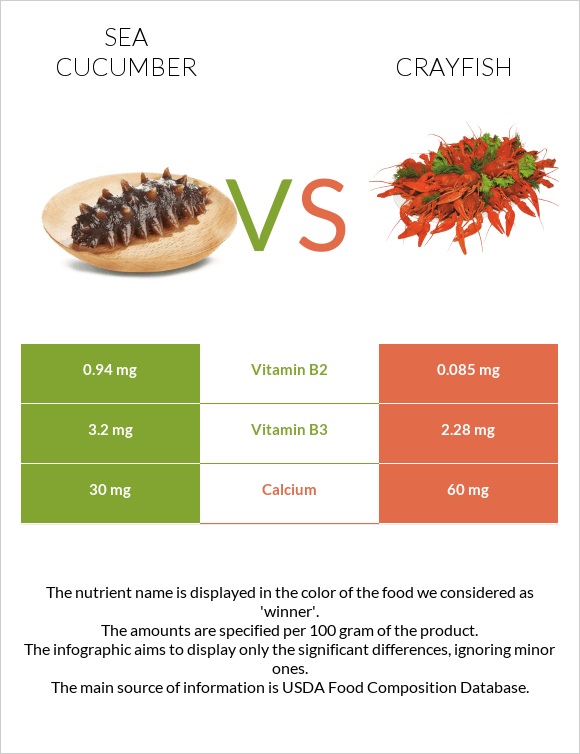Sea cucumber vs. Crayfish — In-Depth Nutrition Comparison
Compare
What are the main differences between sea cucumber and crayfish?
- Crayfish has less vitamin B2, vitamin B3, and vitamin A than sea cucumber.
- Sea cucumber's daily need coverage for vitamin B2 is 66% higher.
- Sea cucumber has 6 times more vitamin A than crayfish. Sea cucumber has 310 IU of vitamin A, while crayfish has 50 IU.
We used Sea cucumber, yane (Alaska Native) and Crustaceans, crayfish, mixed species, wild, cooked, moist heat types in this comparison.
Infographic

Infographic link
Mineral Comparison
Mineral comparison score is based on the number of minerals by which one or the other food is richer. The "coverage" charts below show how much of the daily needs can be covered by 300 grams of the food.
| Contains less SodiumSodium | -100% |
| Contains more CalciumCalcium | +100% |
| Contains more IronIron | +38.3% |
Vitamin Comparison
Vitamin comparison score is based on the number of vitamins by which one or the other food is richer. The "coverage" charts below show how much of the daily needs can be covered by 300 grams of the food.
| Contains more Vitamin B2Vitamin B2 | +1005.9% |
| Contains more Vitamin B3Vitamin B3 | +40.4% |
All nutrients comparison - raw data values
| Nutrient |  |
 |
DV% diff. |
| Vitamin B12 | 2.15µg | 90% | |
| Copper | 0.685mg | 76% | |
| Selenium | 36.7µg | 67% | |
| Vitamin B2 | 0.94mg | 0.085mg | 66% |
| Cholesterol | 133mg | 44% | |
| Phosphorus | 270mg | 39% | |
| Manganese | 0.522mg | 23% | |
| Zinc | 1.76mg | 16% | |
| Choline | 80.9mg | 15% | |
| Vitamin B5 | 0.58mg | 12% | |
| Folate | 44µg | 11% | |
| Vitamin E | 1.5mg | 10% | |
| Potassium | 296mg | 9% | |
| Protein | 13g | 16.77g | 8% |
| Magnesium | 33mg | 8% | |
| Vitamin B3 | 3.2mg | 2.28mg | 6% |
| Vitamin B6 | 0.076mg | 6% | |
| Sodium | 94mg | 4% | |
| Calcium | 30mg | 60mg | 3% |
| Iron | 0.6mg | 0.83mg | 3% |
| Vitamin A | 15µg | 2% | |
| Polyunsaturated fat | 0.367g | 2% | |
| Calories | 56kcal | 82kcal | 1% |
| Fats | 0.4g | 1.2g | 1% |
| Vitamin C | 0.9mg | 1% | |
| Saturated fat | 0.181g | 1% | |
| Monounsaturated fat | 0.244g | 1% | |
| Vitamin B1 | 0.05mg | 0.05mg | 0% |
| Vitamin K | 0.1µg | 0% | |
| Tryptophan | 0.234mg | 0% | |
| Threonine | 0.676mg | 0% | |
| Isoleucine | 0.811mg | 0% | |
| Leucine | 1.329mg | 0% | |
| Lysine | 1.457mg | 0% | |
| Methionine | 0.472mg | 0% | |
| Phenylalanine | 0.706mg | 0% | |
| Valine | 0.786mg | 0% | |
| Histidine | 0.341mg | 0% | |
| Omega-3 - EPA | 0.119g | N/A | |
| Omega-3 - DHA | 0.047g | N/A |
Macronutrient Comparison
Macronutrient breakdown side-by-side comparison
Protein:
13 g
Fats:
0.4 g
Carbs:
0 g
Water:
80.7 g
Other:
5.9 g
Protein:
16.77 g
Fats:
1.2 g
Carbs:
0 g
Water:
79.37 g
Other:
2.66 g
| Contains more OtherOther | +121.8% |
| Contains more ProteinProtein | +29% |
| Contains more FatsFats | +200% |
~equal in
Carbs
~0g
~equal in
Water
~79.37g




